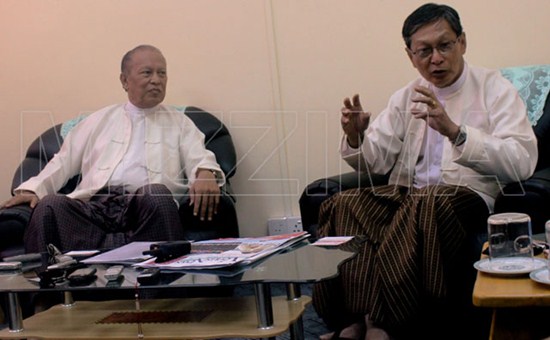The ruling this week that the Myanmar National Human Rights Commission (MNHRC) was formed without Parliament’s approval will have no effect on the operations of the agency, commission officials said on Wednesday.
 Myanmar National Human Rights Commission chairman Win Mya, left, and vice chairman Kyaw Tin Swe, right, at media conference in Rangoon on Wednesday, March 28, 2012. Photo: Mizzima
Myanmar National Human Rights Commission chairman Win Mya, left, and vice chairman Kyaw Tin Swe, right, at media conference in Rangoon on Wednesday, March 28, 2012. Photo: Mizzima
The agency will continue to operate and redress the problem of its formation when Parliament reconvenes, according to a statement issued by the commission.
The commission said it will continue to promote the fundamental rights of Burmese citizens “with added momentum,” with or without government funding. It defended its creation through a decree issued by President Thein Sein.
Benjamin Zawacki, a Burma researcher at Amnesty International, told VOA from Bangkok the incident raises a more important question of whether the organization is independent from President Thein Sein.
“While it is not illegal to have such a commission appointed by a president, it does raise fundamental questions of the commission's level of independence … Each and every one of the members of the commission was handpicked by the president, and some have gone on record defending the country's rather abysmal human rights record.”
He said the organization may be able to be more independent if it receives the support of both the parliament and the president.
The issue of the commission’s independence was questioned by U.N. human rights envoy to Burma Tomas Ojea during his visit in early February, saying it appeared not to have the necessary autonomy it needs to be fully independent.
On March 16, Parliament removed the commission’s funding from its appropriations bill, after a ruling by a bill committee that the commission had been created by order of President Thein Sein without the approval of Parliament.
The Constitution stipulates that such commissions with ministerial rank must be approved by Parliament.
To overcome the problem, the commission said in a statement: “To strengthen the MNHRC in the long run, the commission, pursuant to the guidance of the president, is already drafting an enabling national human rights commission act. The commission will submit the draft to the president and, if approved, present it to the Union Assembly for adoption.”
Mizzima reported on Tuesday that the government had requested a budget of 547,208 million kyat for the Human Rights Commission – formed by order of President Thein Sein on September 5 – for the 2012-13 fiscal year, in addition to 139.86 million kyat for capital expenditure on office equipment, furniture and vehicles, the newspaper reported.
Parliament Speaker Khin Aung Myint forwarded the budget request – made as part of the 2012-13 National Planning Bill – to the Joint Bill Committee after doubts were raised by Lower House representative Nan Wah Nu of Konhein about the commission’s eligibility for funding. Nan Wah Nu challenged the way the commission was formed on March 15.
On March 16, the speaker said that based on the bill committee’s report, the commission’s requested budget could not be approved because the commission had not been formed with the Parliament’s approval and its policies and objectives had not been included in the national planning bill.
Earlier, Nan Wah Nu had argued that the president’s order that the commission’s chairman “be given privileges and insignia of a minister and its members are entitled to what a deputy minister is given” violated the Constitution.
“The Myanmar National Human Rights Commission can only be included as a union-level body or central body after it is approved by the Hluttaw [Parliament],” she said.
The MNHRC was formed on September 5, 2011, in order to promote and protect the fundamental rights of Burmese citizens.
The chairman and the vice chairman of the commission are retired ambassadors Win Mya and Kyaw Tint Swe, respectively; Sit Myaing, the director general of Social Welfare Department, is secretary.


